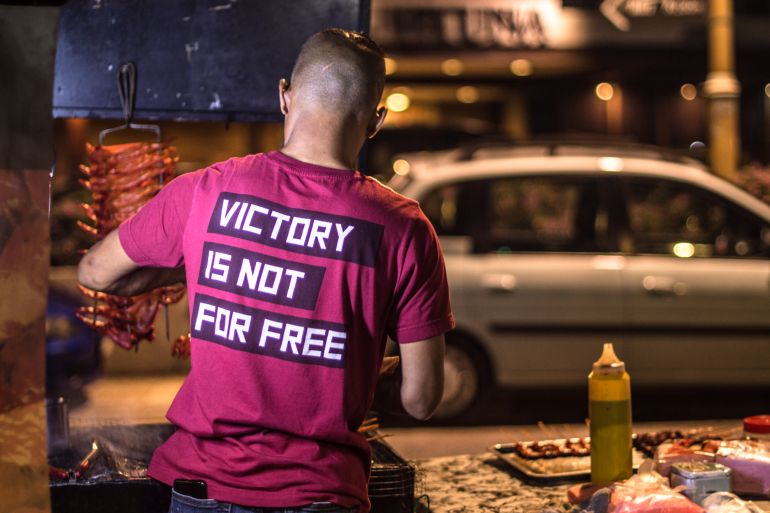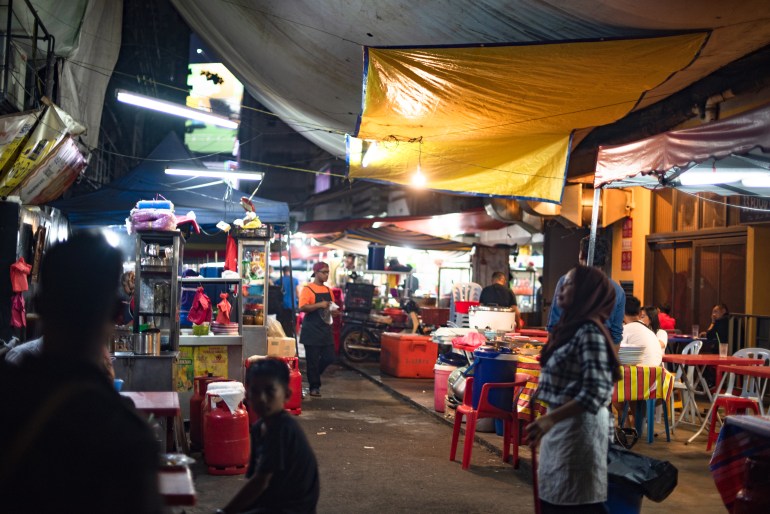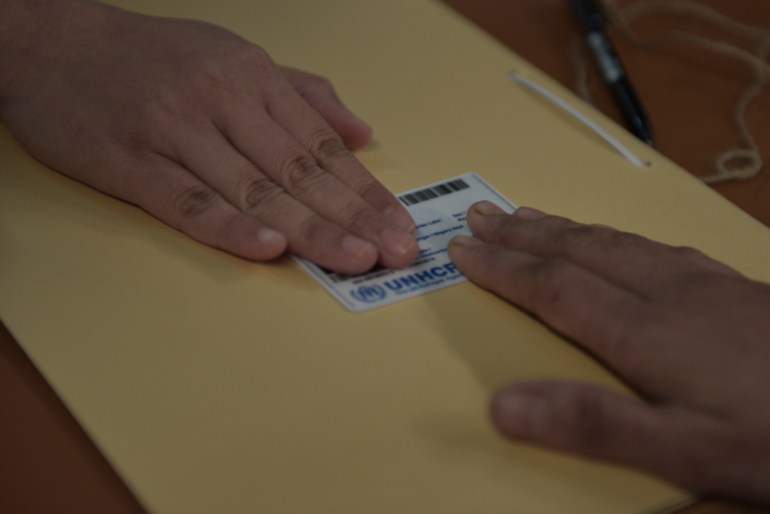Refugees risk exploitation, abuse in Malaysia food industry
Malaysian law does not recognise refugees so many are forced to work informally to support themselves.

Kuala Lumpur, Malaysia – When Mirron* came from Somalia to Malaysia in 2018, she had no idea what it was really like to be a refugee in the Southeast Asian nation.
The 24-year-old thought she would be able to work while she waited for the UN refugee agency to offer her resettlement in a third country, but the reality has proved starkly different.
Keep reading
list of 4 itemsSix killed as hundreds of Rohingya flee Malaysia detention
In Malaysia, young people find their voice amid a pandemic
Malaysia’s new PM brings graft-tainted UMNO back to power
Mirron found a job as a waitress in a Malaysian-owned restaurant in Kuala Lumpur, but because she is a refugee and is not officially allowed to work, she was given no written contract. She had only a verbal agreement with the owners.
She was promised a salary of 1,300 Malaysian ringgit ($296) a month for 72 hours of work a week. With no alternative, she agreed.
But Mirron was never paid.
“After the first month, they told me I had to work for another month to get paid because I’m still new. Then they said I should work for another month too. At that point I knew I was wasting my time as they wanted to exploit me more, so I left,” she told Al Jazeera.
During the short time she had the job, Mirron was forced to work unpaid overtime hours, and clean the toilets and floors. She told Al Jazeera that she was the target of racist remarks about her skin colour and, on one occasion, was sexually harassed by a co-worker.
“I couldn’t tell anyone about what happened to me, because I was scared of the stigma the community subjects women to when they talk about such incidents … even if you go to the police, you will get in trouble for working,” she said.
Lack of protection
Mirron is not the only refugee to find themselves in such a situation. According to the UN High Commissioner for Refugees, Malaysia had more than 182,000 refugees and asylum seekers as of April 2022, with more than 136,000 over the age of 18.
Despite being host to so many people fleeing conflict and abuse, Malaysia lacks an effective legal framework to legitimise the position of refugees in the country, and local laws do not distinguish (PDF) between refugees, asylum seekers and undocumented migrants. Nor is the country a signatory to the 1951 Refugee Convention or its 1967 protocol.
The legal disparity leaves the refugees without the right to work or send their children to school and leaves them vulnerable to arrest by the authorities and exploitation by employers.
A 2019 study (PDF) by the International Labour Organisation highlighted the vulnerability of refugees and asylum seekers in Malaysia to forced labour and different forms of exploitation.
“The lack of legal protection gives rise to a widespread situation in which they are compelled to work illegally, and most of the jobs that they find are 3D jobs,” the study found, referring to the ‘difficult, dangerous and dirty’ kind of work that Malaysians try to avoid.
Many refugees end up working in restaurants where they clean tables, handle the washing up and do other menial tasks, sometimes for as many as 16 hours a day.
Without legal protection, many do not receive Malaysia’s national minimum pay – 1,500 Malaysian ringgit ($342) per month or 7.21 Malaysian ringgit ($1.64) an hour – and are at risk of being cheated by their employers.
Sivaranjani Manickam, the community outreach manager at refugee rights organisation Asylum Access Malaysia, told Al Jazeera that exploitation happens on a daily basis, with the food industry the main culprit.
“70 percent of the employment disputes we receive are from the food industry, and 90 percent of them involve unpaid salaries, with other reports of unreasonable termination, sexual harassment and work injuries,” she said.

Asylum Access has stepped up efforts to publicise its employment disputes programme among refugee communities. As a result, the number of disputes jumped to 212 last year, compared with just 54 in 2018, Manickam said. Most incidents occurred in the Klang Valley – the area around Kuala Lumpur – as well as the southern state of Johor, and Penang in the north.
The UNHCR does not engage directly in such disputes but does try to offer support.
“We engage with law enforcement authorities and other relevant bodies in the countries in managing labour-related disputes involving refugees and asylum seekers,” Yante Ismail, UNHCR’s spokesperson in Kuala Lumpur, told Al Jazeera.
Adel*, a 28-year-old refugee from Syria, started working in a restaurant in Kuala Lumpur after arriving in Malaysia in 2017. He recalls being rejected for many jobs because he was a refugee and did not have a work visa.
Despite working for more than a year in the restaurant, Adel eventually quit as a result of what he says was his unjust treatment. He says he was paid 20 percent less than his Malaysian colleagues who did the same job with shorter shifts.
“When I asked why they get paid more, they told me it’s because we are foreigners,” he told Al Jazeera. “I still remember on Labour Day [May 1] they didn’t allow us to take the day off. They said it’s for Malaysians only.”
Adel said that during his work at the restaurant, he faced daily xenophobic remarks from his Malaysian manager, who used to verbally abuse him along with other refugee and migrant workers.
“She used to call me stupid and outsider in Malay, thinking I could not understand her, but I couldn’t talk back or seek help from anyone because I wanted to keep my job,” he said.
Unfulfilled promises
Malaysia, which has long relied on workers from countries such as Indonesia and Bangladesh to do low-paid work in construction, restaurants and other industries, has talked of allowing refugees to work legally.
The boldest pledge came back in 2018 when the Pakatan Harapan alliance promised to legitimise the status of refugees and ensure their right to work.
“Their labour rights will be at par with locals and this initiative will reduce the country’s need for foreign workers and lower the risk of refugees from becoming involved in criminal activities and underground economies,” the coalition wrote in its election manifesto.

Pakatan won a historic election victory that year, but the plan was never implemented. Worse, it denied UNHCR access to immigration centres in August 2019, preventing the organisation from identifying refugees and asylum seekers in detention and working on their release.
The coalition that replaced Pakatan following an internal power grab also promised new efforts to integrate refugees into the workforce.
Prime Minister Muhyiddin Yassin, who was toppled after 18 months in the job, set up a committee to look into refugee work.
That committee is now headed by Human Resources Minister M Saravanan.
In March 2022, he said the committee was developing guidelines to grant refugees the right to work in Malaysia but did not provide any clear timeline on how long the process would take.
The UNHCR supports the initiative.
“UNHCR believes that a work scheme to allow genuine refugees the opportunity to work lawfully would provide a source of willing labour to support and contribute to the Malaysian economy,” Yante said.
According to a 2019 report (PDF) by the Institute for Democracy and Economic Affairs (IDEAS), a Malaysian think tank, granting refugees the right to work would allow them to contribute more than 3 billion Malaysian ringgit ($683M) to the economy through higher spending by 2024.
It would also mean an increase in tax revenues and the creation of more than 4,000 jobs for Malaysians, the report said.
For a refugee like Adel, having the right to work would change his life. He would be able to support himself and his family, and have his rights protected.
“All I want is to have an opportunity like everyone else,” he said. “I don’t want to be treated in a special way, I just want to be treated fairly.”
*Pseudonyms have been used to protect the refugees’ identity.